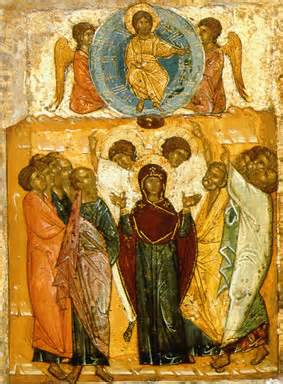Originally appeared in the Catholic Times, issue: May 12, 2013
When beginning studies for a Masters Degree in theology, I was in the midst of a difficult time in other areas of my life. Perhaps it was Providence that one book assigned for a seminar was Ronald Rolheisers The Holy Longing. The instructor required each member of the class to prepare a presentation on a particular chapter. Mine was The Paschal Mystery. That was almost eight years ago, and I still find hope and wisdom in Rolheisers presentation of that holy mystery.
Rolheiser put a colloquial twist on the Ascension, describing its message this way: Do not cling to the old, let it ascend and give you its blessing. A necessary step to Pentecost, where we accept the Spirit for the moment we are living.
I had always thought of the Ascension as an event in Jesus life, not in my own. He told his disciples during their last meal before his death that his going away is necessary: for if I do not go away, the Counselor will not come to your; but if I go, I will send him to you. Death. That was Jesus first going away.
His followers were devastated. Confused and afraid, they talked, and waited, and worried. Im sure they prayed, but perhaps it was the same type of prayer we hold in our hearts when life takes turns we do not understand, and we cannot find God anywhere in it.
Then came the resurrection. Jesus was back! He shared food with them, blessed them, and walked with them. When they finally realized who he was, they must have been euphoric. But there was a problem: He wasnt going to stay.
When Mary Magdalene first saw Jesus in the garden after his resurrection, she didnt recognize him. But when she heard him say her name, she knew. Her first response? To hang on.
Do not hold me, for I have not yet ascended to my Father, he said to her. It might sound harsh. Whats the harm?
As much as she wanted to have Jesus back the way he was, to have their familiar relationship continue, Jesus said that was not possible. He wasnt the same. How he related to her, and later to his other followers and to the world would be different, determined not by the past, but by the present.
Faced by difficulties in my own life, I sometimes longed to have things return to how they had been. Or more truthfully, how I thought they had been. Those familiar times seemed easier. I wasnt sure what the future held, and as the saying goes, we sometimes prefer the devil we know to the devil we dont. Change isnt easy, and as progressive or open-minded as I imagined myself to be, the truth was, I didnt look forward to a big change.
Mary and the other disciples of Jesus, likely would have preferred that he stick around and continue to have conversations with them over meals, to preach, to increase his following. An unspeakably cruel death had taken their friend and leader from them. They wanted him back.
It wasnt to be. They had to learn letting go was essential to receiving the Spirit, the blessing Jesus had promised to send.
As Rolheiser said, we, too, must let go in order to receive the Spirit in our lives. The past, as difficult or as wonderful as it may have been, communicated some bit of Gods life to us. It held some blessing unique to that time. At the moment, we may not have been aware of it. Perhaps seeing it remains difficult. But, hanging on, reliving the past, dwelling there in our minds and hearts, does not bring the blessing closer or make it clearer. It was a gift of the moment. And we must move on.
Jesus says, dont cling. Let me go. I will send the Spirit to you. Now. Just as he did last year, last month, a decade ago. The Ascension calls us to trust that Spirit-gift then and to trust it now. We meet God in the present, even if, like the travelers on the road to Emmaus, we dont always recognize it. At some time, it will become clear.
Meanwhile, we are called again and again to let go, to trust the blessings we have received, and to be present to the moment, where we meet God, and where blessing continues to pour over us.
© 2013 Mary van Balen

Speak Your Mind